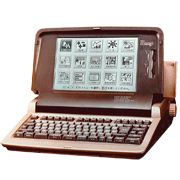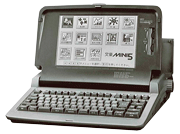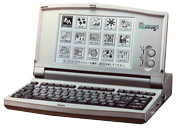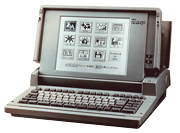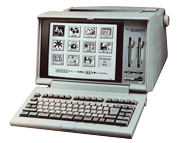In October 1992, NEC started selling three new personal word processor models. The new models were loaded with numerous printing functions, making it easy and affordable to create business cards with portraits, pictures for coloring, and other printed materials. The new high-end models were intended to bolster NEC’s word processor lineup. The mini 5SH offered color printing, the mini 5SV had faster printing speeds, and the mini 5Sj came in a notebook size.
Two other models — the mini 7SV laptop word processor for full-fledged business applications and the mini 7SR with a CRT monitor — were rolled out at the same time.
- The mini 5SH, mini 5SV, and mini 5Sj had the following features.
- (1)The three models came with 18 printing functions, including 11 Bungo Omoshiro Insatsu fun printing styles, iron-on transfer printing, and reply-postcard printing.
- (2)The word processors included an auto layout function that adjusted the address font to fit the postcard, and a convenient address print function that would automatically print business titles or the sender’s phone number.
- (3)Three Japanese typefaces — Heisei Mincho, Heisei Kaku Gothic, and Mouhitsu — and nine Western typefaces were built in and all were outline fonts using 3D Bezier curves.
- The mini 7SV and mini 7SR had the following features.
- (1)The word processors came with a number of business application programs, including a powerful spreadsheet program that could calculate percentages and standard deviations, a “personal card” card-based database for efficient management of personal or work information, and drawing software for creating illustrations, figures, and maps.
- (2)The preinstalled Art Pro software made it possible to freely arrange text and change its shape. For example, characters could be aligned on a curve or characters could be reshaped to fit inside a trapezoid.
- (3)Nine printing functions, such as pictures for coloring, business cards, and blank maps, were included.
| Specifications of the Bungo mini 5SH, mini 5SV, and mini 5Sj | Specifications of the Bungo mini 7SV and mini 7SR | ||
|---|---|---|---|
| Introduced | October 1992 | October 1992 | |
| Display device | Monitor | Backlit, white-mode LCD monitor 40 Japanese characters x 22 lines, 16 x 16 pixels Standard, Expanded, and Condensed modes |
7SV: Backlit, white-mode LCD monitor 7SR: 12-inch flat CRT monitor 40 Japanese characters x 24 lines, 16 x 16 pixels Standard and Condensed modes |
| Entry devices | Keyboard | JIS | JIS |
| Entry modes | AI conversion / Clause-level conversion Intelligent tutorial functions |
AI conversion / Clause-level conversion Intelligent tutorial functions |
|
|
Dictionaries Standard AI |
~225,000 words ~70,000 examples |
~200,000 words ~70,000 examples |
|
| Built-in characters | 1990 JIS Level 1 and Level 2 characters | 1990 JIS Level 1 and Level 2 characters | |
| Storage devices |
Internal External Other |
30 pages (1000 characters / page) One 3.5-inch floppy drive One memory card slot |
30 / 12 pages (1000 characters / page) Two 3.5-inch floppy drives One memory card slot |
| Printing devices |
Printer Speed Paper widths |
5SH and 5SV: 160 dpi multi-line printer Equivalent to 230 characters/second Prepaid postcard to B4 widths (maximum 90 characters/line) 5Sj: 64-dot printer Equivalent to 65 characters/second Prepaid postcard to B4 widths (maximum 90 characters/line) |
160 dpi multi-line thermal printer Equivalent to 86 characters/second Prepaid postcard to B4 widths (maximum 90 characters/line) |
| Other specifications |
External dimensions [mm] Weight Power supply Power consumption |
5SH and 5SV: 378 x 398 x 99 (w x d x h) 6.1 kg 100 VAC Standby: 17 W, Printing: 50 W 5Sj: 335 x 282 x 65 (w x d x h) 3.6 kg 100 VAC Standby: 12 W, Printing: 34 W |
7SV: 390 x 412 x 106 (w x d x h) 7.8 kg 100 VAC Standby: 20 W, Printing: 50 W 7SR: 388 x 377 x 288 (w x d x h) 14 kg 100 VAC Standby: 45 W, Printing: 80 W |


